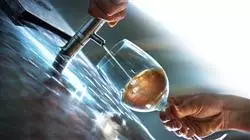University certificate
The world's largest faculty of nutrition”
Introduction to the Program
With this Postgraduate diploma you will learn about TECH and its implications in the final product of the vineyards in only 6 months"

The speed of industrial processes clashes directly with the quality of the products, since artisanal production has always shown greater advantages in most agri-food products. An example of this is organic and ecological agriculture. The purpose of these systems is to respect the genes of the plantations and to exalt the innate properties of the fruits so that they are reflected in the final product.
In this line, the nature of the grape depends on aspects such as berry size, sugar, total acidity and pH of the wine, among other elements. For this reason, nutritional specialists working in this area must pay attention to the planting process from its first phase and understand the importance of having a well-balanced soil, a key aspect to obtain a quality grape. For this reason, TECH has designed a program that aims to broaden the theoretical and practical knowledge of graduates in Nutrition and other professionals interested in grapevine compounds so that they can master their parameters, using adapted analytical techniques.
It is a 100% online program that allows an intensive monitoring of the subject, being the student the one who chooses the pace of study, time and place. In addition, TECH has called on a team of experts who will transmit all their knowledge in the real scenario of action so that the specialists not only have theoretical notions, but also enter into practice from the advice of experts versed in Enological Chemistry. An academic opportunity that stands out from the rest by providing a multitude of audiovisual materials in various formats and by offering a reference guide that can be downloaded, so that students can have it even after completing the program.
Sign up now to delve into specific analyses for the control of raw materials and access new possibilities for scientific study”
This Postgraduate diploma in Enological Chemistry contains the most complete and up-to-date scientific program on the market. The most important features include:
- The development of case studies presented by experts in nutrition, gastronomy and chemistry
- Enological Engineering and Viticulture
- The graphic, schematic, and practical contents with which they are created, provide practical information on the disciplines that are essential for professional practice
- Practical exercises where self-assessment can be used to improve learning
- Its special emphasis on innovative methodologies
- Theoretical lessons, questions to the expert, debate forums on controversial topics, and individual reflection assignments
- Content that is accessible from any fixed or portable device with an Internet connection
Delve into the methods of counting microorganisms and microscopic identification of microbial groups to become an expert in chemical analysis of wine properties”
The program’s teaching staff includes professionals from the sector who contribute their work experience to this educational program, as well as renowned specialists from leading societies and prestigious universities.
Its multimedia content, developed with the latest educational technology, will provide the professionals with situated and contextual learning, i.e., a simulated environment that will provide an immersive education programmed to learn in real situations.
The design of this program focuses on Problem-Based Learning, by means of which the professionals must try to solve the different professional practice situations that are presented throughout the academic course. For this purpose, the students will be assisted by an innovative interactive video system created by renowned experts.
The oak barrel plays a fundamental role in its interaction with the wine. Get to know all the ins and outs of this stage of winemaking thanks to a fully digital titration"

Thanks to TECH, you will be able to identify errors in the elaboration of barrels that can influence the properties of the final product"
Why study at TECH?
TECH is the world’s largest online university. With an impressive catalog of more than 14,000 university programs available in 11 languages, it is positioned as a leader in employability, with a 99% job placement rate. In addition, it relies on an enormous faculty of more than 6,000 professors of the highest international renown.

Study at the world's largest online university and guarantee your professional success. The future starts at TECH”
The world’s best online university according to FORBES
The prestigious Forbes magazine, specialized in business and finance, has highlighted TECH as “the world's best online university” This is what they have recently stated in an article in their digital edition in which they echo the success story of this institution, “thanks to the academic offer it provides, the selection of its teaching staff, and an innovative learning method aimed at educating the professionals of the future”
A revolutionary study method, a cutting-edge faculty and a practical focus: the key to TECH's success.
The most complete study plans on the university scene
TECH offers the most complete study plans on the university scene, with syllabuses that cover fundamental concepts and, at the same time, the main scientific advances in their specific scientific areas. In addition, these programs are continuously being updated to guarantee students the academic vanguard and the most in-demand professional skills. In this way, the university's qualifications provide its graduates with a significant advantage to propel their careers to success.
TECH offers the most comprehensive and intensive study plans on the current university scene.
A world-class teaching staff
TECH's teaching staff is made up of more than 6,000 professors with the highest international recognition. Professors, researchers and top executives of multinational companies, including Isaiah Covington, performance coach of the Boston Celtics; Magda Romanska, principal investigator at Harvard MetaLAB; Ignacio Wistumba, chairman of the department of translational molecular pathology at MD Anderson Cancer Center; and D.W. Pine, creative director of TIME magazine, among others.
Internationally renowned experts, specialized in different branches of Health, Technology, Communication and Business, form part of the TECH faculty.
A unique learning method
TECH is the first university to use Relearning in all its programs. It is the best online learning methodology, accredited with international teaching quality certifications, provided by prestigious educational agencies. In addition, this disruptive educational model is complemented with the “Case Method”, thereby setting up a unique online teaching strategy. Innovative teaching resources are also implemented, including detailed videos, infographics and interactive summaries.
TECH combines Relearning and the Case Method in all its university programs to guarantee excellent theoretical and practical learning, studying whenever and wherever you want.
The world's largest online university
TECH is the world’s largest online university. We are the largest educational institution, with the best and widest online educational catalog, one hundred percent online and covering the vast majority of areas of knowledge. We offer a large selection of our own degrees and accredited online undergraduate and postgraduate degrees. In total, more than 14,000 university degrees, in eleven different languages, make us the largest educational largest in the world.
TECH has the world's most extensive catalog of academic and official programs, available in more than 11 languages.
Google Premier Partner
The American technology giant has awarded TECH the Google Google Premier Partner badge. This award, which is only available to 3% of the world's companies, highlights the efficient, flexible and tailored experience that this university provides to students. The recognition as a Google Premier Partner not only accredits the maximum rigor, performance and investment in TECH's digital infrastructures, but also places this university as one of the world's leading technology companies.
Google has positioned TECH in the top 3% of the world's most important technology companies by awarding it its Google Premier Partner badge.
The official online university of the NBA
TECH is the official online university of the NBA. Thanks to our agreement with the biggest league in basketball, we offer our students exclusive university programs, as well as a wide variety of educational resources focused on the business of the league and other areas of the sports industry. Each program is made up of a uniquely designed syllabus and features exceptional guest hosts: professionals with a distinguished sports background who will offer their expertise on the most relevant topics.
TECH has been selected by the NBA, the world's top basketball league, as its official online university.
The top-rated university by its students
Students have positioned TECH as the world's top-rated university on the main review websites, with a highest rating of 4.9 out of 5, obtained from more than 1,000 reviews. These results consolidate TECH as the benchmark university institution at an international level, reflecting the excellence and positive impact of its educational model.” reflecting the excellence and positive impact of its educational model.”
TECH is the world’s top-rated university by its students.
Leaders in employability
TECH has managed to become the leading university in employability. 99% of its students obtain jobs in the academic field they have studied, within one year of completing any of the university's programs. A similar number achieve immediate career enhancement. All this thanks to a study methodology that bases its effectiveness on the acquisition of practical skills, which are absolutely necessary for professional development.
99% of TECH graduates find a job within a year of completing their studies.
Postgraduate Diploma in Enological Chemistry
Enological chemistry is a scientific discipline that focuses on the study of the chemical processes that take place during the production of wine. This branch of chemistry is essential for understanding and controlling the fundamental aspects that affect the quality, stability and organoleptic characteristics of wines. Taking into account that the wine industry is one of the most important worldwide, and that the quality of its products is fundamental for the success of any winery, TECH Global University developed a complete Postgraduate Diploma in Enological Chemistry. A high-level online postgraduate course, which is presented as a unique qualification opportunity to take your skills to the next level. This completely online program will add to your curriculum the most updated competencies in the market so that you can perform effectively in the field of enological chemistry. The study plan will provide you with extensive knowledge related to wine production and quality control, fermentation chemistry, wine maturation and aging, among others.
Promote your career in the wine industry
How do you identify and analyze the compounds that determine the aroma and flavor of a wine, what is the quality control process? And how does alcoholic fermentation, malolactic fermentation, the extraction or transformation of phenolic compounds and the stability of the aromas present in the wine work? These and other questions will be answered with this Postgraduate Diploma, created by the best specialists at TECH. The study plan will pay special attention to the use of advanced analytical techniques for the evaluation of wine quality, such as liquid chromatography and mass spectrometry. As a result, you will be highly qualified to work in the wine industry, both in wineries and in specialized laboratories. The rigorousness of the content, coupled with a 100% online methodology, make this educational offer an infallible opportunity to add skills to your career, thus amplifying your sphere of influence in the field of enological chemistry.







